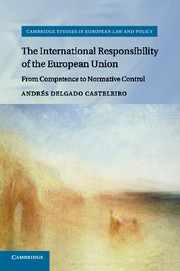Book contents
- Frontmatter
- Contents
- Series Editors' Preface
- Acknowledgements
- Introduction
- 1 The EU's Normative Control and International Responsibility
- 2 Codifying of the Responsibility of International Organizations (I): The Impact of ARIO's Rules of Attribution on the EU
- 3 Codifying of the Responsibility of International Organizations (II): The Impact of ARIO's Rules of Responsibility on the EU
- 4 EU Declarations of Competence to Multilateral Agreements: A Useful Internal Reference Base?
- 5 The Apportionment of the EU's International Responsibility in International Environmental Law: The International Application of EU Declarations of Competence
- 6 The EU's Normative Control and International Responsibility: The WTO Dispute Settlement System
- 7 Normative Control in the EU and the Responsibility of Member States: An Analysis of the Responsibility of the EU in International Investment Law
- Conclusions
- Bibliography
- Index
4 - EU Declarations of Competence to Multilateral Agreements: A Useful Internal Reference Base?
Published online by Cambridge University Press: 05 September 2016
- Frontmatter
- Contents
- Series Editors' Preface
- Acknowledgements
- Introduction
- 1 The EU's Normative Control and International Responsibility
- 2 Codifying of the Responsibility of International Organizations (I): The Impact of ARIO's Rules of Attribution on the EU
- 3 Codifying of the Responsibility of International Organizations (II): The Impact of ARIO's Rules of Responsibility on the EU
- 4 EU Declarations of Competence to Multilateral Agreements: A Useful Internal Reference Base?
- 5 The Apportionment of the EU's International Responsibility in International Environmental Law: The International Application of EU Declarations of Competence
- 6 The EU's Normative Control and International Responsibility: The WTO Dispute Settlement System
- 7 Normative Control in the EU and the Responsibility of Member States: An Analysis of the Responsibility of the EU in International Investment Law
- Conclusions
- Bibliography
- Index
Summary
Introduction
The joint participation of the EU and its Member States in an international agreement blurs the extent of the rights and obligations governed by the agreement. The use of this mixed formula can create situations of uncertainty for third parties since it avoids the question of the division of competence between the EU and its Member States in matters governed by the mixed agreement. The desire of third parties to a mixed agreement to know the scope of the competence and the responsibility of the EU and its Member States has been the driving force behind a specific treaty-making practice developed by the EU in the framework of multilateral agreements. Within these multilateral conventions, third parties want to know beforehand who is voting (to avoid a double exercise of voting rights); who is implementing (to ensure compliance); and, more importantly; who is responsible for a breach of the agreement (even before an internationally wrongful act has been committed): the EU and/or its Member States? In response to these concerns, the EU makes a declaration when concluding the mixed agreement delimiting the extent to which the international agreement falls within EU competence. In other words, declarations of competence are an attempt to apportion responsibilities within a multilateral agreement based on who has competence (the EU and/or its Member States) over issues covered by specific provisions of the multilateral agreement.
These declarations of competence externalize an internal matter (i.e. the vertical division of competences). Moreover, the vertical division of competences is one of the most complex and debated issues in EU external relations law, not only among scholars, but also among the EU institutions.
Initially, declarations of competence were supported by neither the Commission nor the CJEU. In their view, the distribution of competences should have remained an internal issue. However, in recent years both the Commission and the CJEU have gradually accepted the possibility of clarifying the internal division of competences to third parties to mixed agreements. The Commission has learned to recognize that third parties might require a declaration of competence from the EU so it can conclude the agreement and it relies on them when pleading in Luxembourg. Moreover, the CJEU has used them increasingly when interpreting mixed agreements, and when dealing with complex external competence issues, leading the Court to acknowledge that declarations of competence constitute ‘a useful reference base’.
- Type
- Chapter
- Information
- The International Responsibility of the European UnionFrom Competence to Normative Control, pp. 110 - 129Publisher: Cambridge University PressPrint publication year: 2016



